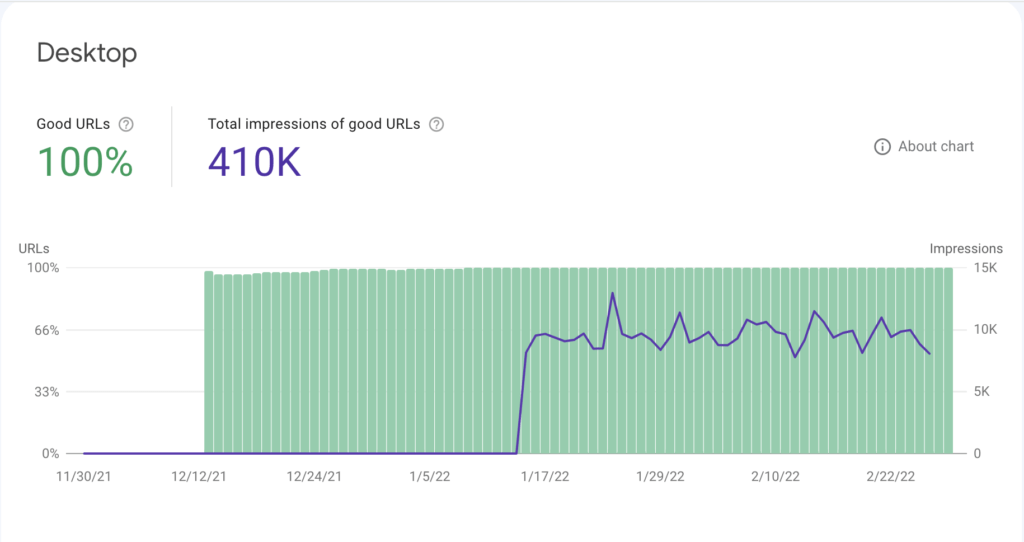Google has announced page experience ranking for desktop, an update to the search engine results page (SERP) which started rolling out February 22nd. This update is expected to be completed by the end of March 2022 (according to the official Google Timeline.)
The February 2022 update is aligned with Google’s broader page experience and core web vitals metrics updates from 2021, and, according to their official statement, it is not expected to bring significant changes in search engine ranks and results.
What is changing?
Google’s page experience update for desktop is meant to align the desktop experience with the page experience signals Google already uses to rank websites on mobile.
This update introduces the notion of “perceived performance,” a pivotal point for assessing website performance. With this update, Google’s algorithm shifts from not only factoring page speed as a primary metric of good website performance, but now looks at how users perceive and interact with the page while it is being loaded.
The page experience ranking update does not change things significantly for desktop as Google has already switched to mobile-first indexing, which means that websites are assessed and ranked based on the mobile version of the website.
This is a reminder for all marketers and web developers that user experience is very much a focus for Google. By rolling out this update and the corresponding reports for desktop, Google wants to ensure every website is built to offer the best user experience possible, whether it’s visited from desktop or mobile devices.
What will happen next with my website?
The short answer is “nothing significant.” We don’t expect any changes for clients’ websites for a variety of reasons.
- As we’ve previously mentioned, Google’s official statement notes that page experience ranking for desktop is not an update that will create shifts in search results. One of the primary reasons is that mobile-first indexing is already used by the search engine when it crawls websites.
- Most consumers use mobile devices to access the internet, which is consistent with the user behavior of our clients’ target audiences.
- Most importantly, our core SEO strategy at Hennessey Digital already includes ensuring our clients’ websites pass page experience assessments for mobile and desktop.

A client’s website performance after beginning work with Hennessey Digital
Our POV and next steps
At Hennessey Digital, we always adhere to Google’s guidelines for optimal results for our clients. When this page experience update started rolling out, we made sure our SEO strategy was centered around passing the assessments for both mobile as well as desktop. As a result, there is no need for us to shift our strategy at this point in time.
We are closely monitoring Google page experience reports on a regular basis and are making sure we identify and act on recommendations made by our Analytics and SEO teams to ensure our clients’ websites are in top shape from a technical perspective.
Noteworthy items
- There are numerous ranking factors that determine the position of a website in search results. The search engine results page (SERP) is a very dynamic landscape. As such, fluctuations are expected on a regular basis. That is why our focus is to achieve and maintain the best results for our clients’ organic visibility to ensure a competitive advantage. We are always looking for opportunities to improve our clients’ online visibility and performance.
- Behind the scenes, Google is always updating the way it ranks websites. We always look for signs of algorithm updates, confirmed as well as unconfirmed. There is always a chance that algorithm updates can be reversed or adjusted based on the data. This is why one of our main areas of focus for clients is always monitoring patterns and making adjustments to SEO strategy with the end goal to attract more traffic and conversions.
